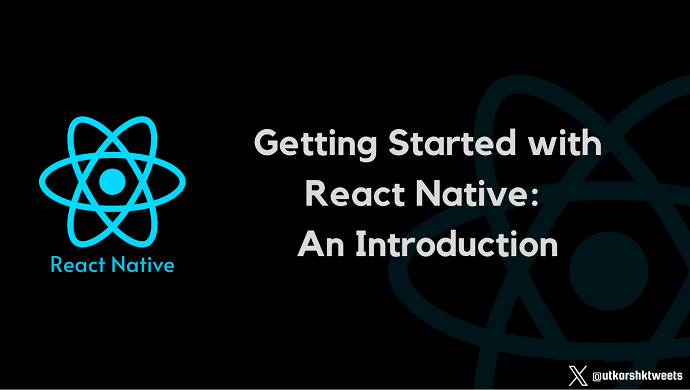Getting Started with React Native: An Introduction

If you're stepping into the realm of mobile app development, React Native is a name that's bound to catch your attention. Whether you're a seasoned developer or just starting your programming journey, React Native offers an intriguing avenue to explore. In this blog post, we embark on a journey to uncover the basics of React Native, delve into its advantages, explore its use cases, and understand what you need to get started.
Introduction to React Native
React Native is an open-source framework, nurtured by Facebook, that empowers you to craft mobile applications using JavaScript and React. What sets React Native apart in the world of mobile app development is its knack for producing genuinely native apps for both iOS and Android platforms, all from a single codebase.
In conventional mobile app development, you often find yourself crafting separate code for iOS and Android, doubling the workload and complexity. React Native gracefully sidesteps this hurdle by allowing you to script most of your logic in JavaScript, which can then be shared across platforms while rendering native components for each platform.
This approach offers a compelling advantage for developers: you can maintain a single codebase, getting your app to market faster, and, just as importantly, leverage your existing JavaScript and React skills.
Advantages of React Native
Cross-Platform Compatibility
React Native opens the door to building apps that effortlessly span both iOS and Android with just one codebase. This not only reduces development time but also ensures a consistent user experience across platforms.
Hot Reloading
A standout feature of React Native is hot reloading. It allows you to witness code changes in real-time within your app without the need to rebuild the entire project. This nimble feature drastically speeds up the development process.
Large Community and Ecosystem
React Native thrives on the support of a vast and active community. This translates into a treasure trove of libraries, plugins, and resources that can significantly expedite your app development journey.
Performance
While React Native apps might not rival fully native apps in terms of speed, they offer commendable performance, especially for most common use cases. Plus, if performance optimization is critical, you can write native modules in Objective-C, Swift, or Java.
Cost-Efficiency
As you can utilize a single codebase for both platforms, React Native proves to be a cost-effective choice, making it appealing for startups and businesses working within budget constraints.
Use Cases for React Native
React Native's versatility makes it an excellent choice for a wide range of mobile applications, including:
Social Media Apps: The likes of Facebook, Instagram, and Twitter have embraced React Native to streamline development and maintenance.
E-commerce Apps: React Native's cross-platform prowess shines in e-commerce apps, ensuring a uniform shopping experience for users on both iOS and Android.
Travel Apps: Apps such as Airbnb have made React Native their go-to framework to deliver a seamless booking experience to users across different platforms.
Business and Productivity Apps: React Native is apt for building apps with intricate interactions and data manipulation, making it a prime candidate for business and productivity tools.
Basics of JavaScript and React Knowledge
Before you embark on your React Native journey, it's crucial to have a solid grasp of JavaScript and React. Here's what you should have under your belt:
JavaScript: Comfort with JavaScript is a must since it's the primary language at play in React Native. Familiarity with concepts like variables, functions, arrays, and objects is essential.
React: Get acquainted with React, a JavaScript library for crafting user interfaces. React forms the nucleus of React Native, so understanding concepts such as components, props, state, and JSX (JavaScript XML) will prove immensely beneficial.
If JavaScript and React are not your strong suits, consider dedicating some time to learning and practicing these foundational concepts. There's a wealth of online resources, tutorials, and courses that can help you get up to speed.
Native v/s Cross-Platform App Development
Before we wrap up, let's briefly explore the concepts of native and cross-platform app development, as they share an intertwined relationship with React Native.
Native App Development
Pros:
Maximum Performance: Native apps are meticulously optimized for their respective platforms (iOS or Android), delivering top-tier performance.
Access to Platform-Specific Features: Native development offers full access to the unique features and capabilities of each platform.
Cons:
Development Time: Crafting separate apps for iOS and Android consumes more time and effort.
Learning Curve: Learning platform-specific languages and development environments (Swift/Obj-C for iOS, Java/Kotlin for Android) can be a formidable challenge.
Cross-Platform App Development
Pros:
Code Reusability: Cross-platform frameworks like React Native facilitate code sharing across iOS and Android, substantially slashing development time.
Skill Reusability: If you already wield JavaScript and React skills, you can leverage them for cross-platform development.
Cons:
Performance: Cross-platform apps may not match the performance levels of native apps, especially for resource-intensive tasks.
Limited Access to Native Features: While cross-platform frameworks provide access to many native features, some platform-specific functionalities may necessitate custom native modules.
Conclusion:
React Native stands as a potent framework that straddles the divide between native and cross-platform app development, offering a tantalizing blend of code reusability and native performance.
As you embark on your React Native journey, keep an eye out for the next blog where we'll delve into "Setting Up Your Development Environment for React Native".
Stay tuned!

